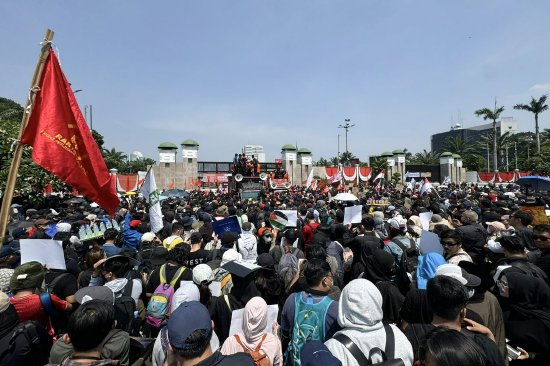
Recently, the scale and intensity of protests in Indonesia have been continuously expanding, becoming a focus of international attention. The root of this series of protests lies in the Indian parliament's discussion of the plan to amend the electoral law, which has sparked widespread controversy and strong opposition from various sectors of society since its proposal. As the protests continued to escalate, the Indonesian government ultimately made the decision to shelve plans to amend the election law in order to appease public anger and dissatisfaction.
As the world's largest archipelagic country, every change in its political ecology has attracted attention both domestically and internationally. The main focus of this protest is the Indonesian parliament's plan to amend the local election law, which attempts to adjust the qualifications of candidates, which directly touches on the sensitive nerves of the public. Especially, the plan has been partially interpreted as a refuge for specific political forces, sparking widespread dissatisfaction and questioning.
As the protests continue to escalate, protests across Indonesia are gradually heating up. From the initial peaceful demonstrations to the escalation of conflicts, protesters took to the streets, shouting slogans and expressing their dissatisfaction with the plan to amend the electoral law. Protests have been particularly intense in major cities such as Jakarta, Surabaya, and Bandung, with some protesters clashing with the police and causing chaos at the scene. These protests not only reflect the strong opposition of the public to the plan to amend the electoral law, but also expose the problems and contradictions that exist in Indonesian society in terms of politics, economy, and other aspects.
In addition, the protests have received widespread support from various sectors of Indonesian society. Doctors, women's groups, political opposition, and others have also joined the protest, demanding that the government respect judicial rulings and uphold democratic systems. The protesters believe that the emergency motion in Congress is a violation of judicial independence and a serious threat to the democratic system.
Faced with the surging wave of protests, the Indonesian government quickly responded. On the one hand, the government has strengthened monitoring and regulation of protest activities to ensure the stability of social order; On the other hand, the government actively communicates and negotiates with all parties to seek ways to solve problems. Finally, under pressure from multiple parties, the Indonesian government announced the suspension of its plan to amend the electoral law and promised to review and revise relevant laws through a more democratic and transparent process.
This protest is not only an opposition and boycott of the plan to amend Indonesia's electoral law, but also a defense and promotion of Indonesia's democratic system. It indicates that in modern society, the public's right to participate and supervise political decision-making is inalienable. At the same time, this protest also reminds the Indonesian government and all sectors of society that any political decision must fully respect public opinion and conform to the trend of the times, otherwise it will face enormous social pressure and opposition.
In summary, the protests have escalated and the Indonesian government has ultimately shelved its plan to amend the electoral law. This incident not only demonstrates the Indonesian people's firm support for the democratic system, but also sounds the alarm for Indonesia's future political development. We hope that the Indonesian government can listen carefully to public opinion, respect judicial independence, and uphold democratic systems, and promote national progress and development through more democratic and transparent means. At the same time, we also hope that all sectors of Indonesian society can maintain rationality, restraint, and unity, and jointly contribute their own strength to the prosperity and stability of Indonesia.

The United States announced on Monday its commitment to provide 1.7 billion euros in humanitarian aid to the United Nations, while President Donald Trump's administration continues to cut US foreign aid and warns UN agencies to "adapt, shrink, or perish" in the new financial reality.
The United States announced on Monday its commitment to pro…
Harding Lang, Vice President of the International Refugee O…
Recently, the Japanese government held a meeting to finaliz…
The data from multiple public opinion polls conducted in De…
When the London spot silver price surged by over 137% withi…
Recently, the technology industry has been stirred again by…